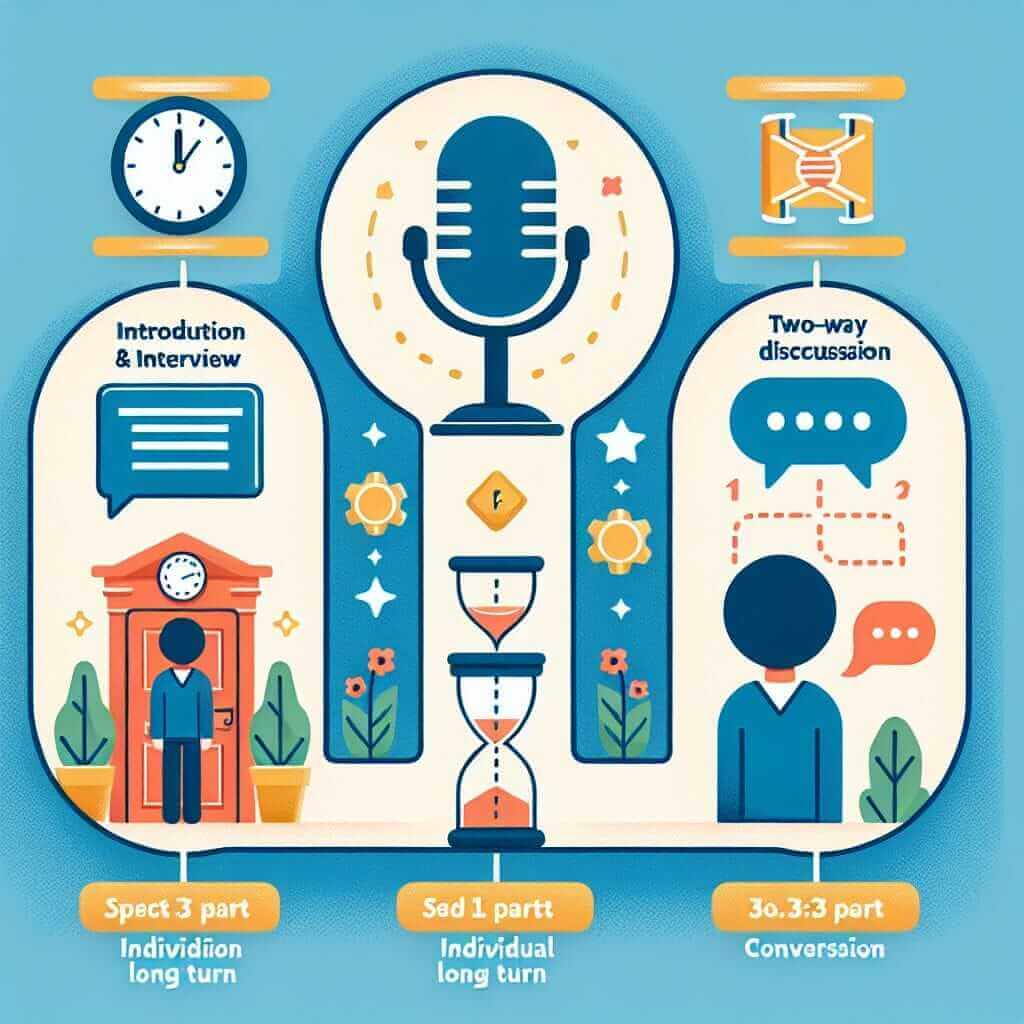The IELTS Speaking test often causes apprehension among candidates, yet it’s a crucial component of the exam, assessing your ability to communicate effectively in English. Whether you’re aiming for academic pursuits, professional opportunities, or visa applications, a strong speaking performance is essential.
This comprehensive guide, crafted by an experienced IELTS instructor with over 20 years of experience, will delve into effective strategies to help you conquer the IELTS Speaking test.
Understanding the IELTS Speaking Test Format
Before diving into preparation strategies, let’s break down the IELTS Speaking test format:
Structure of the Test:
The test consists of three parts:
-
Part 1: Introduction & Interview (4-5 minutes): This section involves general questions about yourself, your hobbies, interests, and familiar topics.
-
Part 2: Individual Long Turn (3-4 minutes): You will receive a cue card with a specific topic and prompts. You’ll have one minute to prepare and then speak for up to two minutes.
-
Part 3: Two-Way Discussion (4-5 minutes): Building upon Part 2’s topic, this section involves a more in-depth discussion with the examiner, exploring broader issues and abstract concepts.
Assessment Criteria:
Your speaking abilities are evaluated based on four key criteria:
-
Fluency and Coherence: This assesses your ability to speak smoothly, clearly, and logically connect your ideas.
-
Lexical Resource (Vocabulary): Examiners evaluate the range and accuracy of your vocabulary, paying attention to your use of less common words and idioms.
-
Grammatical Range and Accuracy: This criterion focuses on your ability to use a variety of grammatical structures correctly.
-
Pronunciation: Your pronunciation should be clear and understandable, demonstrating your ability to use intonation, stress, and rhythm effectively.

Effective Preparation Strategies for IELTS Speaking
1. Master the Art of Speaking
-
Practice Regularly: The key to speaking confidently is consistent practice. Engage in conversations with English speakers, participate in language exchange programs, or record yourself speaking to identify areas for improvement.
-
Expand Your Vocabulary: Enhance your lexical resource by learning new words and phrases related to various topics. Utilize flashcards, vocabulary apps, and make a conscious effort to incorporate these new words into your daily conversations.
-
Focus on Fluency over Perfection: While grammatical accuracy is important, prioritize speaking fluently and coherently. Don’t let the fear of making mistakes hinder your flow.
-
Work on Pronunciation: Pay attention to your pronunciation, intonation, and stress patterns. Listen to native speakers, mimic their pronunciation, and consider using online resources like pronunciation dictionaries.
2. Familiarize Yourself with the Test Format
-
Understand the Structure: Become well-acquainted with the different parts of the IELTS Speaking test and their time limits. This will help you manage your time effectively during the actual exam.
-
Practice with Sample Questions: Utilize IELTS practice materials and online resources to practice answering a variety of questions from all three parts of the test.
-
Record and Analyze Your Responses: Record your practice sessions to identify areas where you excel and areas that need improvement. Analyze your fluency, vocabulary, grammar, and pronunciation.
3. Develop Effective Test-Taking Strategies
-
Extend Your Answers: Provide detailed and elaborate responses, avoiding one-word or very short answers. Support your ideas with reasons and examples.
-
Ask for Clarification if Needed: Don’t hesitate to ask the examiner to repeat a question or clarify anything you don’t understand.
-
Maintain a Positive Attitude: Project confidence and enthusiasm throughout the test. Speak clearly, maintain eye contact, and demonstrate your English language proficiency.
Example IELTS Speaking Questions and Responses
Part 1: Introduction & Interview
Examiner: “Let’s talk about where you live. What do you like most about your hometown?”
Candidate: “Well, I’m originally from a coastal city called Nha Trang, Vietnam. What I appreciate most about it is definitely the stunning coastline. We have these beautiful beaches with crystal-clear water and soft, white sand. It’s a very relaxing and picturesque place to live.”
Part 2: Individual Long Turn
Cue Card: “Describe a memorable trip you have taken.”
Candidate: “One trip that holds a special place in my heart is my journey to the ancient city of Hoi An in Vietnam. It’s a UNESCO World Heritage site known for its well-preserved architecture, vibrant culture, and delicious cuisine. I was captivated by the colorful lanterns illuminating the streets at night and the traditional houses with their unique architectural designs. I particularly enjoyed exploring the local markets, where I sampled various street food delicacies and purchased some handmade souvenirs. It was a truly immersive cultural experience.”
Part 3: Two-Way Discussion
Examiner: “What are the benefits of traveling to different countries?”
Candidate: “I believe that traveling to different countries offers a multitude of benefits. Firstly, it broadens our horizons by exposing us to diverse cultures, customs, and perspectives. It allows us to step outside our comfort zones, challenge our assumptions, and develop a deeper understanding of the world. Secondly, travel provides opportunities for personal growth. It fosters independence, adaptability, and problem-solving skills as we navigate unfamiliar environments. Lastly, traveling can be incredibly enriching, creating lifelong memories and forging connections with people from all walks of life.”
Conclusion:
Remember, success in the IELTS Speaking test requires a combination of dedicated preparation, consistent practice, and effective test-taking strategies. By following the tips outlined in this guide and dedicating sufficient time and effort, you can approach the speaking test with confidence and achieve your desired results. Good luck!